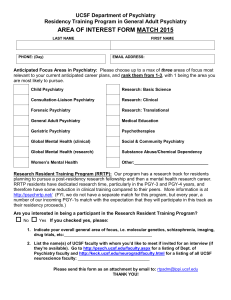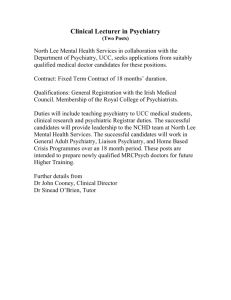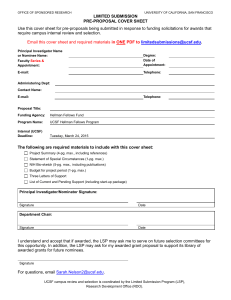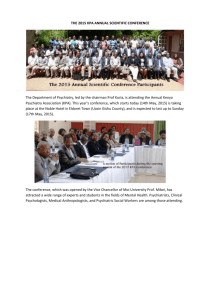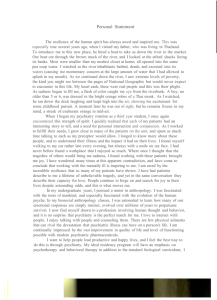IMIG meets - UCSF School of Medicine
advertisement
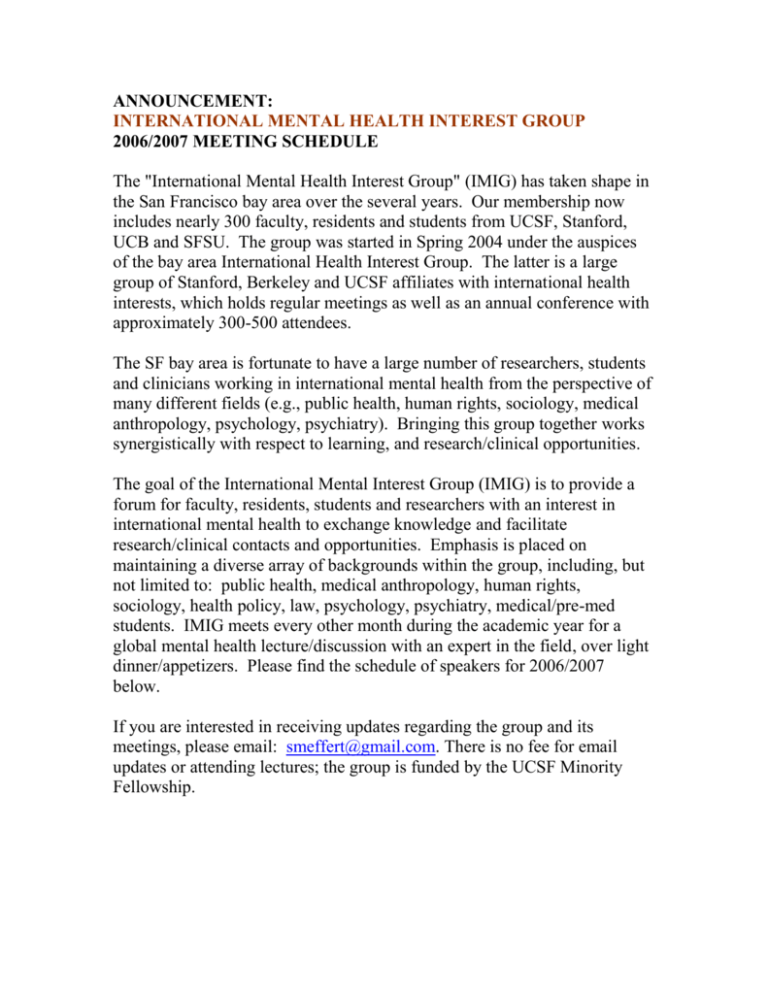
ANNOUNCEMENT: INTERNATIONAL MENTAL HEALTH INTEREST GROUP 2006/2007 MEETING SCHEDULE The "International Mental Health Interest Group" (IMIG) has taken shape in the San Francisco bay area over the several years. Our membership now includes nearly 300 faculty, residents and students from UCSF, Stanford, UCB and SFSU. The group was started in Spring 2004 under the auspices of the bay area International Health Interest Group. The latter is a large group of Stanford, Berkeley and UCSF affiliates with international health interests, which holds regular meetings as well as an annual conference with approximately 300-500 attendees. The SF bay area is fortunate to have a large number of researchers, students and clinicians working in international mental health from the perspective of many different fields (e.g., public health, human rights, sociology, medical anthropology, psychology, psychiatry). Bringing this group together works synergistically with respect to learning, and research/clinical opportunities. The goal of the International Mental Interest Group (IMIG) is to provide a forum for faculty, residents, students and researchers with an interest in international mental health to exchange knowledge and facilitate research/clinical contacts and opportunities. Emphasis is placed on maintaining a diverse array of backgrounds within the group, including, but not limited to: public health, medical anthropology, human rights, sociology, health policy, law, psychology, psychiatry, medical/pre-med students. IMIG meets every other month during the academic year for a global mental health lecture/discussion with an expert in the field, over light dinner/appetizers. Please find the schedule of speakers for 2006/2007 below. If you are interested in receiving updates regarding the group and its meetings, please email: smeffert@gmail.com. There is no fee for email updates or attending lectures; the group is funded by the UCSF Minority Fellowship. IMIG MEETINGS FOR THE ACADEMIC YEAR 2006/2007: September 13th, 2006 7pm; UCSF Parnassus Campus, Langley Porter, Room 371 Dr. Jess Ghannam, PhD (Psychology) UCSF Department of Psychiatry Talk Title: "Psychiatric Effects of War and Occupation: Trauma or Resilience” Dr. Jess Ghannam is Clinical Professor of Psychiatry and faculty in the Global Health Sciences Program at the University of California, San Francisco. He has been working in Palestine for over 15 years teaching, conducting research on post-traumatic stress disorder, and developing community mental health centers throughout Gaza and the West Bank. Dr. Ghannam writes and presents frequently on the Middle East. November 1st, 2006 7pm; UCSF Parnassus Campus, Langley Porter, Room 371 Dr. Robert Okin, MD UCSF Department of Psychiatry Chief of Psychiatry, San Francisco General Hospital Vice Chair, Department of Psychiatry, UCSF Professor of Clinical Psychiatry, UCSF Bio: Since joining the Department in September, 1990, Dr. Okin has undertaken a major expansion of the SFGH community mental health and substance abuse programs and has doubled the size of the Psychiatry Service. Intensive case management has flourished under his leadership. Dr. Okin is a nationally and internationally known expert on human rights for the mentally disabled. He is a member of the Board of Advisors of Mental Disabilities Rights International (MDRI) and has led non-government organization missions to the Ukraine, Hungary, Azerbaijan, Armenia, Mexico, Peru, Paraguay, Turkey, and Romania to investigate human rights violations in the mental health institutions in these countries. Dr. Okin previously served as Chair of the UCSF Clinical Practice Group at SFGH and Interim Chair of the Community Health Network's Medical Practice Group. He is the former Commissioner of Mental Health for the states of Vermont and Massachusetts. Winter/Spring 2007, Date and Location TBA Dr. Stevan Weine, MD International Center on Responses to Catastrophes University of Illinois at Chicago Stevan Weine, a psychiatrist, is a researcher, writer, teacher and clinician in the Department of Psychiatry and the Health Research and Policy Centers of the University of Illinois at Chicago. He is co-founder and co-director of the Project on Genocide, Psychiatry and Witnessing, which provides family-focused community based mental health services to Bosnians, conducts interdisciplinary research on survivors, and engages in mental health reform in post-war countries. His scholarly work focuses on familial, cultural and historical dimensions of traumatization. He is principal investigator of a National Institute of Mental Health funded research study called "A Prevention and Access Intervention for Survivor Families" that is investigating the Coffee and Family Education and Support intervention with Bosnian and Kosovar families in Chicago. In 2001, he was awarded a Career Scientist Award from the National Institute of Mental Health on "Services Based Research with Refugee Families" for which he is conducting an ethnography of Bosnian adolescents and their families. Weine is author of a book of based upon survivor's oral histories called When History is a Nightmare: Lives and Memories of Ethnic Cleansing in Bosnia-Herzegovina (Rutgers, 1999). He is currently writing, "Living Histories", a narrative inquiry of diverse testimony readings from within four different 20th century socio-historical occurrences of political violence. Weine is also Chair of the Task Force on International Trauma Training of the International Society for Traumatic Stress Studies and principal co-author of the "Guidelines for International Trauma Training of Practitioners in Clinical and Community Settings". He is co-founder of the Kosovar Family Professional Education Collaborative and Services and Scientific Director the Services Based Training for Kosovar Community Mental Health and Prevention which is building family-focused community based public mental health services in Kosova. March 14th, 2007 7pm; Location TBA Dr. Jeffery Mandel PhD, MPH UCSF School of Medicine, Center for AIDS Prevention Studies (CAPS) Co-Director of the CAPS International Program Dr. Mandel has been Co-Director of the CAPS International Program for the past seven years. He is a Specialist in the Department of Internal Medicine and is a social-clinical psychologist with a background in health administration. Dr. Mandel has been involved in AIDS behavioral research and clinical care since 1981 and was awarded one of the first NIMH AIDS behavioral research grants in 1983. Since then, he has authored or coauthored 25 articles and 54 presentations at conferences in this field. In 1987, he was given the Hedda Bolgar Achievement Award honoring professional achievement in social-clinical psychology. He has lectured internationally on the psychosocial impact of HIV disease, participated in numerous AIDS-related training activities, and consulted on AIDS-related programs in Asia, Latin America and Eastern Europe. May 9th, 2007 7pm; Location TBA Dr. Uwe Jacobs, PhD (Psychology) Survivors International, Director Uwe Jacobs, Ph.D., has been working with Survivors International for the past 10 years and has provided services for well over 100 survivors of torture from many different countries and has developed and implemented a variety of programs for survivors. He is both a clinical neuropsychologist and a psychotherapist. He is an expert on the psychological and neuropsychological assessment of asylum seekers and has written and published guidelines on this topic (see SI publications). Dr. Jacobs drafted the chapters on the psychological and neuropsychological sequelae of torture for the currently existing international guidelines for the examination of torture published by the UN High Commissioner (Istanbul Protocol) and for the handbook on assessment of asylum seekers by Physicians for Human Rights. Prior to becoming Director of SI, Dr. Jacobs developed other programs for disadvantaged populations. He founded and directed the Homeless Assessment Program through the Wright Institute, Berkeley. He served as the psychological consultant in developing the Life After Exoneration Project (LAEP), a national program for wrongfully convicted ex-prisoners. He conducted workshops and needs assessments with exonerees in New York and Chicago. Dr. Jacobs has also published in the area of psychotherapy process research. Dr. Jacobs has served as an Adjunct Faculty at the Wright Institute, Berkeley since 1997 and maintains an independent practice in Berkeley. Cheers, Susan Meffert MD, MPH UCSF Resident in Psychiatry smeffert@gmail.com
